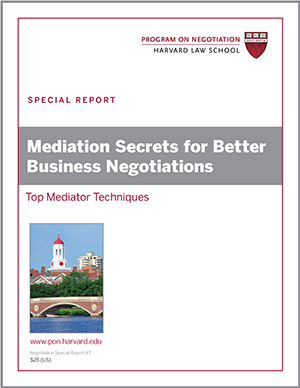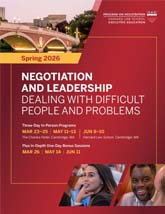
Logrolling is the act of trading across issues in a negotiation. Logrolling requires that a negotiator knows his or her own priorities, but also the priorities of the other side. If one side values something more than the other, they should be given it in exchange for reciprocity on issues that are a higher priority to their opponent.
In three experiments, Roman Trötschel and colleagues found that perspective taking helped self-interested negotiators discover opportunities to log roll and generate mutual gains that reduced partial impasse.
Interestingly, the study participants used perspective taking to reduce partial impasse through logrolling despite remaining self-interested.
By contrast, participants who were encouraged to care about the other party’s outcomes made less-efficient concessions in order to avoid an impasse.
Thus, to reach mutually beneficial agreements in negotiation, an understanding of the other side’s experience may be more important than an altruistic motivation to improve overall outcomes.
Logrolling in Negotiation
In their study, Trötschel and his team looked at whether perspective taking might be particularly useful when negotiators are facing a partial impasse.
Sometimes in negotiation, parties fail to reach an agreement and go their separate ways—that is, they reach an impasse. A partial impasse is also possible: negotiators can’t see eye to eye on certain issues, but they make enough headway on others to wrap up a deal.
For example, a divorcing couple may efficiently divide up most of their assets, yet fail to resolve who should get several items, which remain in storage indefinitely. When a partial impasse occurs, valuable resources can be squandered and opportunities missed.
The research team found logrolling to be an effective technique for resolving partial impasses. In negotiation, logrolling is the process of making beneficial trades across issues based on an understanding of each other’s preferences. If one estranged spouse really wants the flat-screen TV, the other might not mind trading it for a treasured dining table.
Logrolling may sound simple, but it can be quite difficult to implement in a negotiation when parties have self-serving goals and care little about the other side’s outcomes. In such cases, social projection and stereotyping can run rampant, and inefficient agreements are likely.
But in three experiments, Trötschel and colleagues found that perspective taking helped self-interested negotiators discover opportunities to logroll that reduced partial impasse.
Interestingly, the study participants used perspective taking to reduce partial impasse through logrolling despite remaining self-interested.
By contrast, participants who were encouraged to care about the other party’s outcomes made less-efficient concessions in order to avoid an impasse.
Thus, to reach mutually beneficial agreements in negotiation, an understanding of the other side’s experience may be more important than an altruistic motivation to improve overall outcomes.
Although some people (particularly those who have lived abroad) may be naturally inclined toward perspective taking, in this study, simply telling participants to focus on the other side’s intentions and interests improved their perspective taking and their performance.
That’s good news for negotiators who want to maximize their own outcomes by reaching a deeper knowledge of their counterparts’ interests.
What do you think about logrolling in negotiations? Is it an effective method?
Related Mediation Article: Negotiations and Logrolling: How Win-Win Integrative Negotiations Strategies Enable Negotiators to Breakdown Barriers to Agreement at the Bargaining Table
How Your Organization Can Benefit from Mediation Techniques
Adapted from “Breaking a Partial Impasse in Negotiations,” first published in the October 2011 issue of Negotiation.
Originally published in 2014.





Thank you so much for providing for all necessary information. Best wishes for all.
There are quite a range of diverse views when it comes to impasse, particularly in the context of mediation. Some mediators believe that despite seeking to understand the other party’s perspective (as the author here suggests), impasse is inevitable especially in commercial negotiation. I’ve interviewed a whole host of top mediators who are also very experienced litigators and they all agree that impasse is simply part of a process – to the extent that it’s even an expectation that some mediators set right at the beginning of the mediation. One UK mediator I interviewed talked about the impasse being deployed as a deliberate strategy to test the resilience, appetite and position of the other side. On the other hand one top US mediator I interviewed thinks Impasse is just an excuse used by an ineffective mediator. It’s certainly an interesting perspective and you can listen to more of why he thinks this here Impasse is a Mediator’s Cop Out
I think there are a number of techniques mediators use to break through an impasse, I’ve seen logrolling being used (called something different in the UK). The big question is however – how often is impasse just a game being played by both sides?
thanks
Aled